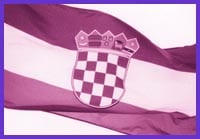In the end, Amir decided his own life was more important than Croatia’s lesbian and gay liberation movement.
“You have to escape,” says 29-year-old Amir. “There is no opportunity anymore to live a decent gay life there.”
Amir, who requests that his last name be withheld because of concerns for his family’s safety back home, co-founded LIGMA, Lesbian And Gay Men In Action.
He says Croatia’s first and only active queer rights group could not survive under the country’s new regime. And Amir fled to Toronto as a refugee a few months ago.
LIGMA was founded in 1992 to provide a voice and a safety net for Croatia’s queer community. It had a help line, hosted support group meetings in whatever space members could find, and was involved in lobbying for political changes.
“A phone line to help gay people was needed, especially by the youth,” says Amir. “Croatia is a very Catholic country. People think being gay is like being sick. There were suicides all the time.”
The fledgling LIGMA was backed by the Italian Transnational Radical Party, a group working for the rights and freedoms of sexual minorities, PWAs, political prisoners and convicted criminals. The group has since been forced out of Croatia.
“There was lot of hope back then that things were changing for the better,” says Amir. “When the war came many gay people wanted to get involved. They thought that independence would mean greater tolerance and freedom.”
The opposite has happened for Croatia’s queers since the partition of Yugoslavia. “After the war the government focussed on destroying NGOs,” claims Amir (that’s non-governmental organizations).
“We were systematically targeted and harassed – not just LIGMA, but any groups working to help people with AIDS, disabled people, feminists or the flora and fauna.”
“There comes a time,” says Amir’s immigration lawyer, El Farouk Khaki, “when you need to draw a line between personal survival and activism.
“The situation in the former Yugoslavia is one of wide spread xenophobia,” claims Khaki, who has represented a steady flow of queer refugees from that region over the past few years. “Anyone other than the mainstream is at risk and there is no protection for them.”
All minority protection laws, which used to extend to rights of nationality and religion, were removed in Croatia soon after independence.
Amir describes the persecution of homosexuals in the region as part of a general climate of intolerance. “Croatians say we are just like Serbs, Serbians say we are like Croats. We are right at the bottom however you look at it.”
LIGMA was forced to close in 1995, buckling under the pressure of constant government surveillance and periodic raids.
The phone line could no longer operate due to police attempts to obtain a list of callers. According to Amir, such a list would be used by officials to blackmail gay men and lesbians. Many could lose their jobs, health care and homes if their orientation were to be publicized.
Most of LIGMA’s members have since escaped to North America or Western Europe. Amir fears for those left behind. “Police are spying on them all the time – it is difficult to talk on the phone or get letters, sometimes they can find a computer and I get e-mail. But most of the time I don’t even know if my friends are still there.”
As an activist, Amir says he knows what it is like to be targeted. He says he’s lost jobs or been asked to work for reduced pay, been arbitrarily detained and been under surveillance from police, his garden was burned and his family’s car was destroyed.
“When gays and lesbians are murdered in Croatia no one finds who did it,” says Amir. “No one is really looking.”
Since coming to Toronto, Amir hasn’t wasted time. He is already volunteering at the 519 Church Street Community Centre and working with Avante, an Italian gay group. He is currently writing a book on the situation of gay, lesbian and transgendered people in the former Yugoslavia.
He is also in a long term relationship, which he says would never have happened in Croatia. “At home everything is a secret, the most you can hide is one night of sex – sometimes good, sometimes bad. Here I have what I always wanted: a beautiful, loving boyfriend. You can quote me on that because I am so proud.”
As well as the new freedoms that Amir is enjoying in Toronto, there are challenges as well. “I am surprised by how commercial gay male life is here,” he says.

 Why you can trust Xtra
Why you can trust Xtra


